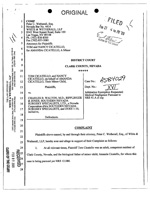Sunday, March 27, 2011 | 2 a.m.
Related stories
Do No Harm: Hospital Care in Las Vegas, Part 5
- Sun investigation reveals flaws in hospital care; solutions offered
- How to put patients first
- Local hospitals’ willingness to change culture would be a step toward better care, transparency
- ‘You can’t kill my mother and get away with it’
- We must adopt a culture of sincere care
- How to file a complaint
Share your stories
A century ago, Dr. Ernest Amory Codman, a Harvard surgeon, led a one-man campaign for health care transparency and in the process became a “martyr of quality.”
Codman thought the public should be able to judge the quality of the care he provided. He also thought reporting errors would help prevent them. So he admitted his errors and published his outcomes, even the unfavorable ones.
He also mocked the Boston medical establishment for not matching his openness.
Codman’s colleagues ostracized him. His practice suffered, and in 1914, he resigned from Massachusetts General Hospital to practice on his own.
More than 80 years later, the medical community is catching up to Codman.
In 1999, the transparency movement got a major boost with publication of “To Err is Human,” the Institute of Medicine’s seminal report that estimated 98,000 patients a year die because of preventable medical errors.
The report, which called for a national reporting system for adverse medical events that result in harm or death, estimated the cost of such incidents at up to $29 billion. (More recent studies have concluded the report underestimated the number of deaths and costs.)
Dr. Lucian Leape, one of the authors of “To Err Is Human,” said the public has a right to know the incidence of infection and injury occurring in local hospitals. It is “absolutely crucial” in building trust, which is the foundation of the doctor-patient relationship, he said.
In 2001, the National Quality Forum, a nonprofit group that develops strategies to measure health care quality, coined the term “never event” to describe 28 medical errors that should never happen. The incidents — now known as “serious reportable events” because they happen too frequently to use the term “never” — include wrong-site surgeries, objects accidentally left inside surgical patients, advanced-stage bedsores, death during a low-risk birth and medication errors resulting in death or disability.
In 2009, Medicare stopped reimbursing hospitals for complications related to certain hospital-acquired infections and injuries.
Still, some in the health care industry resist the calls for transparency.
According to Consumers Union, a nonprofit organization that advocates for patient safety, at least 27 states have some type of mandatory reporting system for serious events, but only 10 require the incidents to be reported to the public in a way that would allow comparison between hospitals.
Modern medicine has yet to fully embrace Codman’s legacy.
The Joint Commission, which inspects and awards accreditation to hospitals, has an award bearing Codman’s name, but doesn’t make its hospital inspection reports public.



Join the Discussion:
Check this out for a full explanation of our conversion to the LiveFyre commenting system and instructions on how to sign up for an account.
Full comments policy